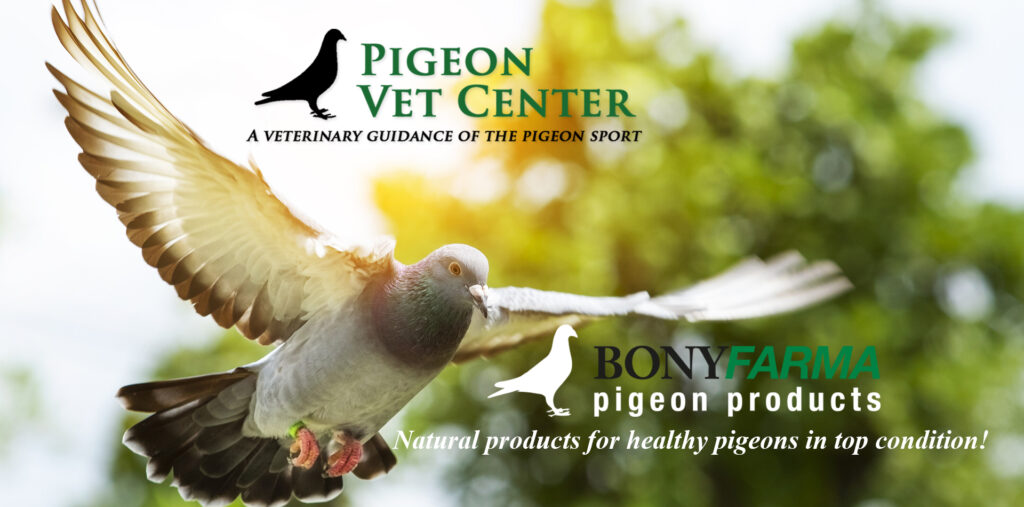Im DEZEMBER 2024 – von Dr. Peter Boskamp…

Die Zuchtzeit
Nach der Mauser ist auch die Zuchtzeit eine wichtige Jahreszeit. Während es während der Mauser wichtig ist, den Brieftauben zu einem guten und festen neuen Gefieder zu verhelfen, ist die Brutzeit wichtig, um den Jungtauben einen optimalen Start ins neue Leben zu ermöglichen.
Vor einigen Jahren hatte ich ein Gespräch mit dem Vorsitzenden eines Taubenvereins über Futter. Der Mann sagte deutlich, dass er seine Zuchttauben mit dem Futter fütterte, das die Jungen und die Witwer zurückließen. Unter dem Deckmantel, dass diese Tauben nichts leisten müssten. Ich habe selten so einen dummen Kommentar gehört. Zuchttauben müssen mit dem besten verfügbaren Futter versorgt werden. Ganz einfach, weil die Kette nur so stark ist wie ihr schwächstes Glied. Die Jungen im Ei, aber auch sobald sie aus dem Ei kommen, müssen sich mit dem begnügen, was die Eltern ihnen bieten können. Wenn das keine optimale Ernährung ist, dann starten diese Jungs schon auf einem schiefen Schlittschuh. Denn wenn diese Jungtauben ein paar Tage unterdurchschnittliche Nahrung zu sich genommen haben, haben diese Jungtiere bereits ein Defizit, das sie kaum noch ausgleichen können.
Das Optimalste ist natürlich, dass die Jungen zu allen Zeiten ihres jungen Lebens über alle Lebensmittelzutaten verfügen, die sie benötigen.
In der Praxis ist das widersprüchlicher als man denkt. Ich möchte hier nichts zu Lasten irgendeines Lebensmittelherstellers schreiben. Jeder Futtermittelhersteller wird versuchen, im Rahmen seiner Möglichkeiten eine gute Zuchtmischung zusammenzustellen. Das macht Sinn. Weil alles vernachlässigt wird, um die Kunden zufrieden zu stellen.
Aber auch Getreidehändler müssen für das Getreide, das sie verwenden wollen, auf dem Weltmarkt suchen. Viele Körner, die aus Nord- und Südamerika stammen, sind GVO-Saatgut. Dabei handelt es sich um gentechnisch verändertes Saatgut, das in der Regel so angebaut wird, dass es größere Mengen an Pestiziden verträgt. Seit diese GVO-Saat verwendet wird, werden die Körner daher mit viel mehr Pestiziden gespritzt als dies früher der Fall war. Glyphosat ist ein häufig verwendetes Medikament. Dieses Arzneimittel besteht aus einer Phosphatgruppe und der Aminosäure Glycin. Eines der Probleme, die dabei entstehen, ist, dass der Körper, wenn er eine Aminosäure wie Glycin benötigt, das Erste nimmt, was verfügbar ist. Glutation ist ein sehr wichtiges Entgiftungsenzym für die Leber und den gesamten Körper. Nun wird also diese Aminosäure wahllos in dieses Enzym eingebaut, was zu einem Enzym führt, das nicht oder kaum funktioniert. Dies wirkt sich auf die Entgiftung des Körpers aus. Nun kann man sagen, dass die Tauben davon nichts mitbekommen. Das ist jedoch der Knackpunkt.
Taubensport ist Spitzensport und alles negative, was verhindert werden kann, sollte besser verhindert werden.
Ich glaube nicht alles so einfach. Also habe ich einige Zuchtmischungen auf das Vorhandensein von Glyphosat testen lassen. In unserer kleinen Studie lag ein Faktor von 65 zwischen dem Futter mit dem höchsten und dem niedrigsten Gehalt an diesem Wirkstoff. In jedem Fall ein Grund für mich, das Zuchtfutter zu verwenden, das am wenigsten Glyphosat enthält.
Aber Glyphosat tut mehr. Glyphosat tötet viele Bodenlebewesen. Dadurch kann das Getreide einen geringeren Gehalt an Nährstoffkomponenten enthalten und dennoch perfekt aussehen. Aber es kommt doch wirklich auf den Gehalt des Futters an. Ich habe mehrere Gespräche mit Futtermittelherstellern geführt und sie alle geben ihr Bestes, um gutes Futter zu produzieren. Und es ist sicher auch so, dass man mit Zuchtfutter alleine auch Tauben züchten kann. Jeder muss also das tun, was er für das Beste für sich und seine Tauben hält.
Als ich jedoch selbst angefangen habe, Jungtauben zu züchten, habe ich für meine Tauben das Bony Breeding Support entwickelt und füge es dem Futter mit Zuchtöl und/oder Bony Omega-Nucleovit bei. Wieso das? Einfach, weil ich nichts dem Zufall überlassen möchte. Wir haben Tests durchgeführt, bei denen die Tauben einiger Züchter diese Zugabe jeden Tag erhielten und Züchter, die diese Ergänzungen nur 2 bis 3 Mal pro Woche veranreichten. Daher ist anzumerken, dass wir als Standardfutter eine qualitativ sehr gute Zuchtmischung verwenden. Generell sehen wir systematisch, dass Jungtauben, die täglich mit einem optimierenden Supplement versorgt werden, deutlich besser wachsen, gesünder sind und ein bis zwei Tage früher beringt werden können. Dieses Jahr war ich aus gesundheitlichen Gründen etwas nachlässig mit der letzten Zucht Jungtauben. Mir ist diese Woche aufgefallen, dass ein paar Tauben deutlich weniger Qualität haben, als ich es gewohnt bin. Konsequentes Handeln ist hier auch eine Pflicht.
Zurück zu den Pestiziden. Leider arbeitet der Lobbyismus in der Europäischen Union derzeit sehr stark. Die Chance ist mehr als real, dass wir uns in Europa in sehr absehbarer Zeit auch mit GVO-Lebensmitteln auseinandersetzen müssen. Die großen und mächtigen Unternehmen drängen uns ihren Willen auf und stellen uns als Verbraucher vor vollendete Tatsachen. So werden unsere Lebensmittel dann zu GVO, ohne dass wir es möglicherweise wissen (es wird nicht auf der Verpackung stehen). Viele Verbraucher wollen keine gentechnisch veränderten Lebensmittel. Wenn dies auf der Verpackung angegeben wäre, könnten Verbraucher wählen. Aber das ist schlecht für den Verkauf. Soweit das…
Unsere Tauben erhalten das Zuchtöl, um möglichst viele Omega-3-Fettsäuren in die Eier zu bekommen. Bereits ab dem Schlüpfen erhalten die Jungtauben täglich Omega-3-Zuchtöl über das Futter. Seit langem ist bekannt, dass Omega-Fettsäuren, EPA und DHA, die Verbindungen zwischen den Gehirnzellen um das Tausendfache steigern können. Dadurch hat der Nachwuchs einen besseren „Prozessor“ zwischen den Ohren.
Ein Jungtier muss nicht nur gut fliegen können, sondern auch „intelligent“ sein. Glyphosat hingegen hemmt die Bildung dieser Quervernetzungen im Gehirn. Ein weiterer Grund, während der Zucht (zumindest bis die Jungen etwas gewachsen sind) Omega 3 und Zucht-Support zu geben.
Das Zucht-Support ist ein Produkt, das wir kaum bewerben müssen. Die Züchter überzeugen sich selbst, sobald sie es benutzen. Auf die Frage, warum diese Produkte alle teuer sind, würde ich sagen, dass es besser ist, weniger Tauben zu züchten, aber diese optimal gesund und gut entwickelt gross werden zu lassen, als mehr Tauben zu züchten, die nicht optimal gewachsen sind. Jeder soll einfach machen was er will. Mit diesem Newsletter möchte ich nur auf die Möglichkeiten hinweisen, die zur Verfügung stehen, um eine optimale Zuchtzeit zu gewährleisten. Bei der Umstellung von Schleim- auf Körnerfutter gebe ich den Tauben gerne etwas Bolektrolplus ins Trinkwasser damit kein feuchter Kot abgesetzt wird.
Die Basisprodukte während der Aufucht bilden Bio B.M.T und Basis Kern, die zusammen mit dem Zucht-Support an das Futter gebunden werden.
Viel Glück.
Viel Erfolg !





